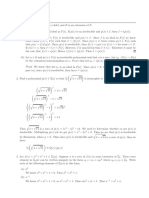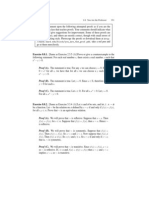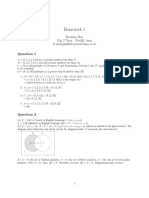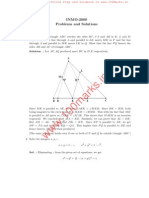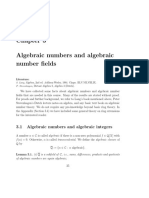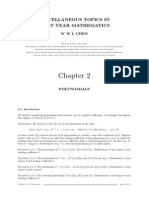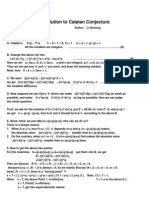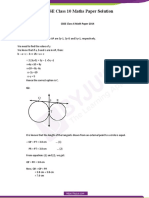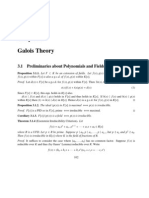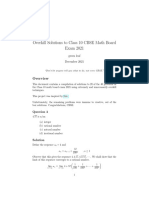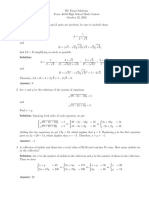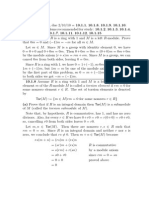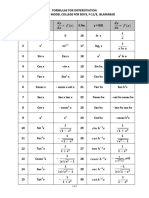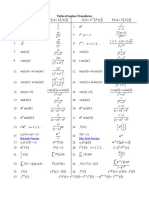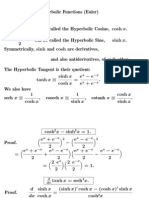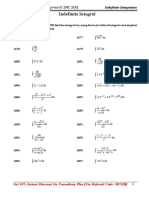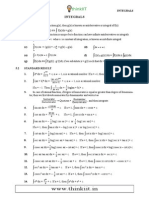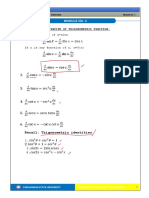Galois Theory 2010 Exam
Galois Theory 2010 Exam
Uploaded by
Varuni MehrotraCopyright:
Available Formats
Galois Theory 2010 Exam
Galois Theory 2010 Exam
Uploaded by
Varuni MehrotraOriginal Description:
Copyright
Available Formats
Share this document
Did you find this document useful?
Is this content inappropriate?
Copyright:
Available Formats
Galois Theory 2010 Exam
Galois Theory 2010 Exam
Uploaded by
Varuni MehrotraCopyright:
Available Formats
Homework 7 Solutions.
6.1 #12. Assuming that is transcendental over Q, show that either + e or e is transcendental over Q. Proof. Suppose, by way of contradiction that + e is algebraic over Q with degree m, and that e is algebraic over Q with degree n. Then we have [Q( + e, e) : Q] mn. Now, consider f (x) = x2 + ( + e)x + e Q( e, + e)[x]. Observe that its roots are and e. Therefore, we have [Q(, e, e, + e) : Q( e, + e)] = [Q(, e) : Q( e, + e)] 2. It follows that [Q(, e) : Q] = [Q(, e) : Q( e, + e)] [Q( e, + e) : Q] 2mn. Since Q(, e), we see that [Q( ) : Q] 2mn, which implies that is algebraic over Q, a contradiction. 6.2 #1. Find the degree and a basis for each of the given eld extensions. (a) Q( 3) over Q. Solution: The minimal polynomial of 3 over Q is f3 (x) = x2 3. (It is monic and irreducible ( 3 -Eisenstein) with 3 as a root.) Hence, we have [ Q ( 3) : Q] = 2; a basis is {1, 3}. (b) Q( 3, 7) over Q. Solution: Part (a) implies that [Q( 3) : Q] = 2. We claim that 7 Q( 3). To see this, suppose on the contrary that 7 Q( 3). Since Q( 3) = Q[ 3], there exists a, b Q with 7 = a + b 3. We suppose that a, b = 0. The case when one of a or 2 b = 0 is similar. Squaring gives 49 = a + 2ab 3 + 3b2 , from which it follows that a2 +3b2 ) 3 = 49(2 Q, a contradiction. Hence, x2 7 is irreducible over Q( 3); it is ab the minimal polynomial over Q( 3), so we conclude that [Q( 3, 7) : Q( 3)] = 2, and that {1, 7} is a basis for Q( 3, 7) over Q( 3). We compute [Q( 3, 7) : Q( 3)] [Q( 3) : Q] = 2 2 = 4; The extension Q( 3, 7) has basis {1, 3, 7, 3 7 = 21} over Q.
(c) Q( 3 + 7) over Q.
Solution: Problem #9 below asserts that Q( 3 + 7) = Q ( 3, 7). An alternative approach is as follows. One can verify that = 3 + 7 satises f (x) = x4 20x2 + 16. It remains to show that f (x) is irreducible over Q. One can use the Rational Root Theorem to verify that f (x) has no linear factors in Q[x], and hence, no cubic factors in Q[x]. To show that f (x) has no quadratic factors in Q[x], we suppose that a, b, c, d Q with f (x) = (x2 + ax + b)(x2 + cx + d). Comparing coefcients yields: a + c = 0; b + ac + d = 20; ad + bc = 0; bd = 16. We deduce that c = a; it follows that ad + bc = a(d b) = 0. Therefore, we have either a = 0 or b = d. a = 0. If a = 0, then c = a = 0. Furthermore, we nd that b + d = 20. Substituting in bd = 16 gives b(b 20) = b2 20b = 16, which implies that b2 + 20b + 16 = 0. One can now use the Rational Root Theorem to show that no such b Q exists. b = d. If b = d, then b = 4. If b = 4, we have b + ac + d = 8 a2 = 20 which gives a2 = 28; no such a Q exists. If b = 4, we have b + ac + d = 8 a2 = 20 which gives a2 = 12; again, no such a Q exists.
We conclude that f (x) is irreducible. Hence, it is the minimal polynomial of over Q. We now have [Q() : Q] = 4. A basis for Q() over Q is {1, , 2 , 3 }. (d) Q( 2, 3 2) over Q. Solution: We observe that 3 2 = [Q( 2) : Q] | [Q( 2, 2) : Q] 3 3 3 = [Q( 2) : Q] | [Q( 2, 2) : Q]. Since gcd(2, 3) = 1, we nd that 6 | [Q( 2, 3 2), Q], so 6 [Q( 2, 3 2) : Q]. On the other hand, we note that 3 3 [Q( 2, 2) : Q] [Q( 2) : Q] [Q( 2) : Q] = 2 3 = 6. We conclude that [Q( 2, 3 2) : Q] = 6. To write down a basis, note that 3 3 [Q( 2, 2) : Q] = [Q( 2, 2) : Q( 2)] [Q( 2) : Q] = 6, 2 so we have [Q( 2, 3 2) : Q( 2)] = 3 with basis {1, 3 2, 3 2 }, and [Q( 2) : Q] = 2 with basis {1, 2}. Therefore, a basis for the degree 6 eld over Q is obtained by multiplying the bases together: 2 2 3 3 3 3 {1, 2, 2, 2 , 2 2, 2 2 } 2
Alternatively, one could take for a basis: = {1, 21/6 , 21/3 , 21/2 , 22/3 , 25/6 }. 6.2 #3. Find the degree of Q( 3 2, 4 5) over Q. Solution: We observe: 3 3 4 3 = [Q( 2) : Q] | [Q( 2, 5) : Q] 3 4 4 4 = [Q( 5) : Q] | [Q( 2, 5) : Q]. 3 4 Since gcd(3 , 4) = 1 , we see that 3 4 = 12 | [ Q ( 2 , 5) : Q]. It follows that 12 [Q( 3 2, 4 5) : Q]. On the other hand, we compute 4 3 4 3 [Q( 2, 5) : Q] [Q( 2) : Q] [Q( 5) : Q] = 3 4 = 12. Therefore, we conclude that [Q( 3 2, 4 5) : Q] = 12. 6.2 #4. Let F be a nite extension of K such that [F : K ] = p is prime. If u F \K , show that F = K (u). Proof. We rst note that K K (u) F . Since u K , we have K = K (u), so [K (u) : K ] > 1. But also, we have [K (u) : K ] | [F : K ] = p. Now, [K (u) : K ] = 1, implies that [K (u) : K ] = p. Multiplicativity of degrees in towers gives [F : K (u)] = 1; hence we conclude that F = K (u). 6.2 #5. Let f (x) be an irreducible polynomial in K [x]. Show that if F is an extension eld of K such that deg(f (x)) is relatively prime to [F : K ], then f (x) is irreducible in F [x]. Proof. Without loss of generality, suppose that f (x) is monic. (If not, we divide f (x) by an appropriate c K \{0} (a unit) to make it monic.) Let u be a root of the polynomial f (x). Then f (x) = fK,u (x) is the minimal polynomial of u over K . We compute [F (u) : K ] in two ways: [F (u) : F ] [F : K ] = [F (u) : F ] = [F (u) : K (u)] [K (u) : K ]. It follows that [K (u) : K ] | [F (u) : F ] [F : K ]. By hypothesis, deg(fK,u (x)) = [K (u) : K ] is relatively prime to [F : K ]. Therefore, we have [K (u) : K ] | [F (u) : F ]; we note that [K (u) : K ] [F (u) : F ]. But K F implies that fF,u (x) | fK,u (x) in F [x], so deg(fK,u (x)) = [K (u) : K ] [F (u) : F ] = deg(fF,u (x)). Hence, we have deg(fF,u (x)) = deg(fK,u (x)). Since fF,u (x) | fK,u (x) and both polynomials are monic, we conclude that fK,u (x) = fF,u (x). I.e., as the minimal polynomial of u over F , f (x) = fK,u (x) is irreducible over F .
6.2 #7. Let F K be elds, and let R be a ring such that F R K . If F is an algebraic extension of K , show that R is a eld. What happens if we do not assume that F is algebraic over K ? Proof. Suppose that R = K , and Let r R\K . Then r = 0. Since r R F , r is algebraic over K : let fK,r (x) = xn + an1 xn1 + + a1 x + a0 K [x] be the minimal polynomial of r over K . Since fK,r (x) is irreducible, we have a0 = 0. Therefore, fK,r (r) = 0 implies that r 1 a0 rn1 + + a1 a0 = 1.
1 1 Note that a exists in R, so R is a division ring. It lies in F , so it is 0 K R. Hence, r commutative. We conclude that R is a eld.
6.2 #9. For any positive integers a, b, show that Q( a + b) = Q( a, b). Proof. Let K := Q ( a, b ) , and let L := Q ( a + b). Suppose that a = b. Then K = Q( a) = Q(2 a) = L. Hence, we may assume that a = b. First, note that a, b K . Therefore, we have a + b K . It follows that L K . Next, we show that a, b L. We observe that ( a + b)2 (a + b) L. ab = 2 Therefore, since a = b, we have b( a + b) ab( a + b) = bL b a a( a + b) ab( a + b) = a L. ab We conclude that K L.
6.2 #10. Let F be an extension eld of K . Let a F be algebraic over K , and let t F be transcendental over K . Show that a + t is transcendental over K . Proof. Suppose, by way of contradiction, that b := a + t is algebraic over K . Note that since a and t F , we have b = a + t F . The set of all elements of F which are algebraic over K form a eld; therefore, since a, b F , it follows that b a = t is algebraic over K . But this contradicts the hypothesis that t is transcendental over K .
You might also like
- Lang Chapter 5Document21 pagesLang Chapter 5Fakhir Shaheen100% (2)
- Laplace TableDocument2 pagesLaplace TableAngel SorianoNo ratings yet
- Complementary Error Function Table: X Erfc (X) X Erfc (X) X Erfc (X) X Erfc (X) X Erfc (X) X Erfc (X) X Erfc (X)Document1 pageComplementary Error Function Table: X Erfc (X) X Erfc (X) X Erfc (X) X Erfc (X) X Erfc (X) X Erfc (X) X Erfc (X)Fernanda VillacísNo ratings yet
- Algebra - Martin ExcerciseDocument2 pagesAlgebra - Martin Excerciselinnette1991No ratings yet
- Homework 6 SolutionsDocument2 pagesHomework 6 SolutionsSufersNo ratings yet
- Field Extension HomeworkDocument4 pagesField Extension HomeworkSuresh kumarNo ratings yet
- 6.2 Finite and Algebraic ExtensionsDocument3 pages6.2 Finite and Algebraic ExtensionsMohan RaoNo ratings yet
- Punto 2 CompletoDocument6 pagesPunto 2 Completotatiana chaconNo ratings yet
- Apmo2008 SolDocument8 pagesApmo2008 SolSơn TèoNo ratings yet
- Real Analysis Sample QuizDocument5 pagesReal Analysis Sample QuizJJ100% (1)
- E463 PDFDocument13 pagesE463 PDFJuan Alex CayyahuaNo ratings yet
- Chapter 6Document19 pagesChapter 6Shyla Patrice DantesNo ratings yet
- Galois Theory: Final Assignment Problem 1: April 24, 2016Document3 pagesGalois Theory: Final Assignment Problem 1: April 24, 2016VJlDsysMRfNo ratings yet
- P-Adic TopologyDocument19 pagesP-Adic TopologyAxlBassiNo ratings yet
- Inmo Sol 2000Document5 pagesInmo Sol 2000ashu_dwy8605No ratings yet
- S Election Internationale 2010 Scientific Test: MathematicsDocument3 pagesS Election Internationale 2010 Scientific Test: MathematicsKlevis KasoNo ratings yet
- Sol 7Document2 pagesSol 7Rafael BelloNo ratings yet
- You Are The ProfessorDocument6 pagesYou Are The Professorsanajar01No ratings yet
- INMO 2012 Paper With SolutionDocument6 pagesINMO 2012 Paper With SolutionDascaliuc DanielNo ratings yet
- Ma 3411 Mich 2013 Worked SolutionsDocument20 pagesMa 3411 Mich 2013 Worked SolutionsM2C7r6No ratings yet
- 1 Algebraic Numbers Over QDocument17 pages1 Algebraic Numbers Over QEfraim CostaNo ratings yet
- MidsolDocument4 pagesMidsolAskhat ZinatNo ratings yet
- hw3 SolutionsDocument11 pageshw3 SolutionsAlok YadavNo ratings yet
- Maths AnualDocument11 pagesMaths Anualjainmanan852No ratings yet
- Mat 603 Lecture NotesDocument45 pagesMat 603 Lecture NotesmukkunameNo ratings yet
- 12 International Mathematics Competition For University StudentsDocument4 pages12 International Mathematics Competition For University StudentsMuhammad Al KahfiNo ratings yet
- Mathematics AssignmentDocument5 pagesMathematics AssignmentBadd ManNo ratings yet
- Equivalence Relations and Well-Defined OperationsDocument11 pagesEquivalence Relations and Well-Defined OperationsMphatso MisindeNo ratings yet
- Homework 5Document3 pagesHomework 5Luis EduardoNo ratings yet
- EuclidDocument4 pagesEuclidayoyaNo ratings yet
- 3 VariableDocument7 pages3 VariableDương Minh ĐứcNo ratings yet
- Inmo-Sol-2000 Previous Year Question Papers of Indian National Mathematical Olympiad (INMO) With SolutionsDocument5 pagesInmo-Sol-2000 Previous Year Question Papers of Indian National Mathematical Olympiad (INMO) With SolutionsAkshay PandeyNo ratings yet
- Solutions e 2010Document19 pagesSolutions e 2010romellramosNo ratings yet
- Allhw 3Document94 pagesAllhw 3kamilbismaNo ratings yet
- Algebraic Numbers and Algebraic Number FieldsDocument16 pagesAlgebraic Numbers and Algebraic Number FieldsJaviera Bastías GonzálezNo ratings yet
- MidSem11 Alt SolDocument5 pagesMidSem11 Alt SolsacredgamesNo ratings yet
- Department of Mathematics, IIT Palakkad MA5006 Jan-April 2022 Problem Sheet 1Document1 pageDepartment of Mathematics, IIT Palakkad MA5006 Jan-April 2022 Problem Sheet 1SeshanNo ratings yet
- Miscellaneous Topics in First Year Mathematics: WwlchenDocument14 pagesMiscellaneous Topics in First Year Mathematics: WwlchenAnonymous 9kzuGaYNo ratings yet
- 2020 Stormersyle Mock AMC 10 SolutionDocument6 pages2020 Stormersyle Mock AMC 10 SolutionmanrongjiangNo ratings yet
- AnswerKey Worksheet 1Document8 pagesAnswerKey Worksheet 1kalkidane31No ratings yet
- The Extreme Solution To Catalan ConjectureDocument7 pagesThe Extreme Solution To Catalan ConjecturekexiongliNo ratings yet
- CBSE Previous Year Question Papers Class 10 Maths 2018 - Learn CBSEDocument27 pagesCBSE Previous Year Question Papers Class 10 Maths 2018 - Learn CBSESakshamNo ratings yet
- CBSE Class 10 Maths Paper SolutionDocument25 pagesCBSE Class 10 Maths Paper SolutionSantanuNo ratings yet
- Algebra Homework 2Document4 pagesAlgebra Homework 2Dipak NarzaryNo ratings yet
- Inmo-2012 Previous Year Question Papers of Indian National Mathematical Olympiad (INMO) With SolutionsDocument6 pagesInmo-2012 Previous Year Question Papers of Indian National Mathematical Olympiad (INMO) With SolutionsAkshay PandeyNo ratings yet
- 1998 99 Prob Solving Ps5Document7 pages1998 99 Prob Solving Ps5aniketNo ratings yet
- Final Exam SolutionsDocument5 pagesFinal Exam SolutionsSrikanta PramanikNo ratings yet
- Galois Theory: 3.1 Preliminaries About Polynomials and FieldsDocument79 pagesGalois Theory: 3.1 Preliminaries About Polynomials and FieldsPaco ZhouNo ratings yet
- Algebra Qualifying Exam SolutionsDocument26 pagesAlgebra Qualifying Exam SolutionsViktor HanNo ratings yet
- Careers: Regional Mathematical Olympiad 2013Document9 pagesCareers: Regional Mathematical Olympiad 2013sameer chaharNo ratings yet
- Overkill Solutions To Class 10 CBSE Math Board Exam 2021: Green Leaf December 2021Document13 pagesOverkill Solutions To Class 10 CBSE Math Board Exam 2021: Green Leaf December 2021Omar islam laskarNo ratings yet
- bcExamSolutionsDocument8 pagesbcExamSolutionsIndro GeniusNo ratings yet
- Problems and Solutions: CRMO-2012, Paper 4: Solution: Let O be the centre of Γ and rDocument3 pagesProblems and Solutions: CRMO-2012, Paper 4: Solution: Let O be the centre of Γ and rumesh_nirmalaNo ratings yet
- Riemann Stieltjes IntegralDocument28 pagesRiemann Stieltjes IntegralxerenusNo ratings yet
- 10+2 Level Mathematics For All Exams GMAT, GRE, CAT, SAT, ACT, IIT JEE, WBJEE, ISI, CMI, RMO, INMO, KVPY Etc.From Everand10+2 Level Mathematics For All Exams GMAT, GRE, CAT, SAT, ACT, IIT JEE, WBJEE, ISI, CMI, RMO, INMO, KVPY Etc.No ratings yet
- Analytic Geometry: Graphic Solutions Using Matlab LanguageFrom EverandAnalytic Geometry: Graphic Solutions Using Matlab LanguageNo ratings yet
- Trigonometric Ratios to Transformations (Trigonometry) Mathematics E-Book For Public ExamsFrom EverandTrigonometric Ratios to Transformations (Trigonometry) Mathematics E-Book For Public ExamsRating: 5 out of 5 stars5/5 (1)
- Transformation of Axes (Geometry) Mathematics Question BankFrom EverandTransformation of Axes (Geometry) Mathematics Question BankRating: 3 out of 5 stars3/5 (1)
- De Moiver's Theorem (Trigonometry) Mathematics Question BankFrom EverandDe Moiver's Theorem (Trigonometry) Mathematics Question BankNo ratings yet
- hw04 2Document3 pageshw04 2Varuni MehrotraNo ratings yet
- CB (R) Banach SpaceDocument6 pagesCB (R) Banach SpaceVaruni MehrotraNo ratings yet
- BSC (H) MathDocument39 pagesBSC (H) MathAmit PatraNo ratings yet
- Groups Fields IntroductionDocument40 pagesGroups Fields IntroductionVaruni MehrotraNo ratings yet
- Separation (Complete) Theory Module-6-BDocument11 pagesSeparation (Complete) Theory Module-6-BRaju SinghNo ratings yet
- Chapter 1 - PARTIAL FRACTIONSDocument16 pagesChapter 1 - PARTIAL FRACTIONSkrissypainty33% (3)
- Differtiation & Integration FormulasDocument2 pagesDiffertiation & Integration Formulasutlmedia123No ratings yet
- MATH 2240 Past PapersDocument5 pagesMATH 2240 Past PapersAJR365No ratings yet
- Table of Fourier Transform PairsDocument5 pagesTable of Fourier Transform PairsDr-Mandeep SinghNo ratings yet
- Elements of Chemical Reaction Engineering H. Scott Fogler Prentice Hall ParcialDocument1 pageElements of Chemical Reaction Engineering H. Scott Fogler Prentice Hall ParcialJWAN RA YA3QOBNo ratings yet
- Grade Xi Maths Practice Paper-Multiple and Submultiple AnglesDocument5 pagesGrade Xi Maths Practice Paper-Multiple and Submultiple Angles8D Audio TuneNo ratings yet
- Trigonometric Minimum & Maximum (CDS - Hindi) - 10 DecDocument69 pagesTrigonometric Minimum & Maximum (CDS - Hindi) - 10 DecJayesh BorseNo ratings yet
- Aat Solutions - Ch05Document73 pagesAat Solutions - Ch05Theodoros MaragakisNo ratings yet
- Math 018 Differential Calculus Trigonometric Identities Prepared By: Dr. Jeffrey G. CapaciteDocument2 pagesMath 018 Differential Calculus Trigonometric Identities Prepared By: Dr. Jeffrey G. CapaciteALECXANDER COLLERANo ratings yet
- Indefinite Integral: B A S I C L e V e LDocument35 pagesIndefinite Integral: B A S I C L e V e LAjit KumarNo ratings yet
- Laplace Table PDFDocument2 pagesLaplace Table PDFMaxi EurekaNo ratings yet
- Trigonometry - Primary Trigonometric Ratios - All Level2 All PDFDocument12 pagesTrigonometry - Primary Trigonometric Ratios - All Level2 All PDFElaine BatistaNo ratings yet
- x x x csc x−2= x−2= x−2= π x x csc x x−1= π x x csc (π −x) x− x+ cos x π x x csc (π−x) x−cos x−sin x= π x x csc (π− x)Document4 pagesx x x csc x−2= x−2= x−2= π x x csc x x−1= π x x csc (π −x) x− x+ cos x π x x csc (π−x) x−cos x−sin x= π x x csc (π− x)Angela AngNo ratings yet
- Worksheet - V: Class: C4 (C Batch) Subject: Mathematics Topic: Trigonometry (Aim 5) Date: 05.04.2020Document1 pageWorksheet - V: Class: C4 (C Batch) Subject: Mathematics Topic: Trigonometry (Aim 5) Date: 05.04.2020siva prasadNo ratings yet
- Trig Substitutions PPDocument3 pagesTrig Substitutions PPYeetisNo ratings yet
- 58 HyperbolicDocument22 pages58 Hyperbolicapi-3738981No ratings yet
- Indefinite Integral: Maths IIT-JEE Best Approach' (MC SIR)Document13 pagesIndefinite Integral: Maths IIT-JEE Best Approach' (MC SIR)Ak TiwariNo ratings yet
- 9 Integrals PDFDocument19 pages9 Integrals PDFthinkiitNo ratings yet
- Type 1: Real (B) Ixl Lyl #0 C) X+y 0, X #0Document3 pagesType 1: Real (B) Ixl Lyl #0 C) X+y 0, X #0ankit satpatiNo ratings yet
- Laplace TableDocument2 pagesLaplace TableMohamed A. AbbasNo ratings yet
- Derivatives Formulas PDFDocument5 pagesDerivatives Formulas PDFJoe StoneNo ratings yet
- FSC Derivatives Integration Formulas and Rules Muzzammil Subhan PDFDocument1 pageFSC Derivatives Integration Formulas and Rules Muzzammil Subhan PDFRana ZuhaibNo ratings yet
- Laplace Transform ProblemsDocument20 pagesLaplace Transform ProblemsMeNo ratings yet
- Tabela DerivadasDocument2 pagesTabela DerivadasJacson CunhaNo ratings yet
- Converting Radians To Degrees and Vice VersaDocument4 pagesConverting Radians To Degrees and Vice VersaChristine Angelie GranadaNo ratings yet
- Module 4Document5 pagesModule 4carlNo ratings yet
- Differentiation Question FinalDocument19 pagesDifferentiation Question FinalAnubhav vaishNo ratings yet





